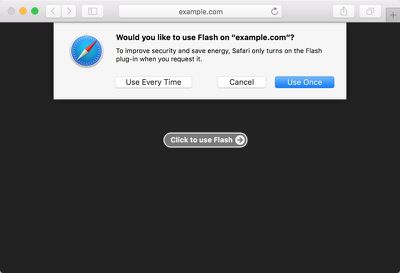In Safari 10, set to ship with macOS Sierra, Apple plans to disable common plug-ins like Adobe Flash, Java, Silverlight, and QuickTime by default in an effort to focus on HTML5 content and improve the overall web browsing experience.
As explained by Apple developer Ricky Mondello in a post on the WebKit blog, when a website offers both Flash and HTML5 content, Safari will always deliver the more modern HTML5 implementation. On a website that requires a plug-in like Adobe Flash to function, users can activate it with a click as can be done in Google's Chrome browser.

Most websites that detect that Flash isn't available, but don't have an HTML5 fallback, display a "Flash isn't installed" message with a link to download Flash from Adobe. If a user clicks on one of those links, Safari will inform them that the plug-in is already installed and offer to activate it just one time or every time the website is visited. The default option is to activate it only once. We have similar handling for the other common plug-ins.
When a website directly embeds a visible plug-in object, Safari instead presents a placeholder element with a "Click to use" button. When that's clicked, Safari offers the user the options of activating the plug-in just one time or every time the user visits that website. Here too, the default option is to activate the plug-in only once.
Safari 10 will also include a command to reload a page with installed plug-ins activated to give users additional options for controlling the content that's displayed, and there are preferences for choosing which plug-ins are visible to which websites in Safari's Security preferences.
Apple recommends web developers implement features using technologies built into Safari to avoid forcing users to activate plug-ins.
Plug-ins like Adobe Flash and Java have been problematic for Apple, requiring frequent security fixes and forced updates to patch an unending stream of vulnerabilities. Apple has long had a policy of blocking older versions of web plug-ins from functioning and its change in Safari 10 is another push towards fully retiring the older technology.



















